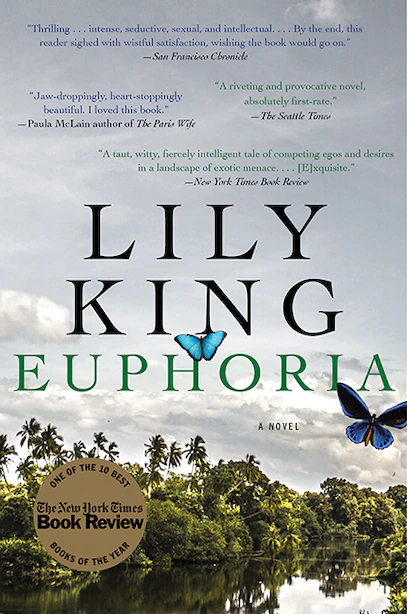
"Euphoria" by Lily King - The New York Times bestselling novel about a love triangle and scientific rivalry based on a true story. BookJack talks about the novel Euphoria by American writer Lily King. King is the author of four novels, but it was Euphoria that brought her fame, which The New York Times included in the top ten books of 2014.
Lily’s first novel, The Pleasing Hour (1999) won the Barnes and Noble Discover Award and was a New York Times Notable Book and an alternate for the PEN/Hemingway Award. Her second, The English Teacher, was a Publishers Weekly Top Ten Book of the Year, a Chicago Tribune Best Book of the Year, and the winner of the Maine Fiction Award. Her third novel, Father of the Rain (2010), was a New York Times Editors Choice, a Publishers Weekly Best Novel of the Year and winner of both the New England Book Award for Fiction and the Maine Fiction Award.
In a first approximation, Lily King's novel Euphoria tells the story of the "golden age of anthropology." In the early 1930s, the trinity of the main characters - a young lanky Englishman Andy and a married couple, American Nell and Australian Fen - meet in New Guinea, on the Sepik River. Andy has been researching the warlike tribe of Kion for two years now and is slowly going mad with loneliness. Miniature Nell - the star of world anthropology and the author of a scandalous monograph on the sexual practices of the indigenous inhabitants of the Solomon Islands - courageously, but with visible difficulty, overcomes the hardships of life without a shower, toilet, medicine and normal food. And only the artistic gloomy Fen seems to get real pleasure from the field work.
Initially, Nell and Fen are opposed to Andy (they consider him an upstart who captured the best region for research), but little by little, the relationship between them undergoes a dramatic change. All three are rivals in the science race, but Andy and Nell are attracted to each other with fierce strength. Fehn, who hides bisexuality under his aggressive masculinity, is also attracted to Andy. But most importantly, all together they are able to grope in the surrounding chaos that which they cannot distinguish individually - a kind of universal scheme that can reveal the deep essence of human culture..
However, the story of a love triangle and scientific rivalry in the jungle (and so very attractive and exciting) hides several more plots embedded in each other.
Andy, Nell and Fehn are essentially three types of interaction between a European and an alien culture. Shackled and unsure of himself, Andy is most concerned with comprehending his own behavior - the degree of his ethics, the distortions that the nature of the observer introduces into observations, the limits of comprehensibility of an alien world. The brutal Fen readily dissolves in the life of the aborigines - he easily learns their languages, adopts habits, even the most exotic, and generally flawlessly adapts, while maintaining a condescending and detached attitude towards “savages”. And only Nell sincerely, with all the love and empathy available to her, seeks to understand another culture, hoping through this comprehension to make the world a better place. Thus, Euphoria also turns out to be a novel about alternative ways of comprehending reality, and about the heady and slightly dangerous result that is achieved through their synthesis.
The invasion of heroes (and, more broadly, Europeans) into the life of the Papuans inevitably leads to drama. Latent anxiety, palpable literally from the first pages, is resolved by a powerful catharsis, once again returning us to reflections on the nature of colonialism, on the relativity of our ideas about the norm and that even the best intentions, in contact with a fragile, incomprehensible and unusual way of life, can lead to disastrous consequences.
Well, and finally, the magic Scheme - a wonderful key to understanding human civilization that Andy, Nell and Fen in their feverish love delirium come up with one night - after just a couple of years turns out to be an excellent argument in favor of Nazi ideology. By conventionally distributing peoples, cultures and even individuals to the cardinal points (“people of the south” are more plastic, caring and compliant, “northerners” are distinguished by a strong will, a craving for power and self-confidence, etc.) weapons into the hands of their own enemies, who, on this basis, proclaim the right of the "Nordic race" to world domination.
If you wish, you can open a few more layers in Euphoria. So, for example, the American Lily King based her novel on the true story of the famous anthropologist Margaret Mead, as well as her second and third husbands - ethnologists Reo Fortune and Gregory Bateson, and the gap between true events and their artistic interpretation is also of considerable interest (spoiler : in fact, everything ended much better than in the novel).
Having packed such an abundance of meanings into more than three hundred pages that are more than modest at the present time, the author achieved an amazing effect: the air inside the novel literally crackles from feverish tension - erotic, intellectual, emotional. Not so much describing, but rather denoting the nodal points of conflicts, outlining the contour of human fate with one scant stroke (in order to describe the entire horror of the environment in which Fen grew up, one neat paragraph is enough), King creates a text of amazing restraint and strength, combining verified brevity with large-scale saturation.
This article was sponsored by Chun-Wei Liu
Comments